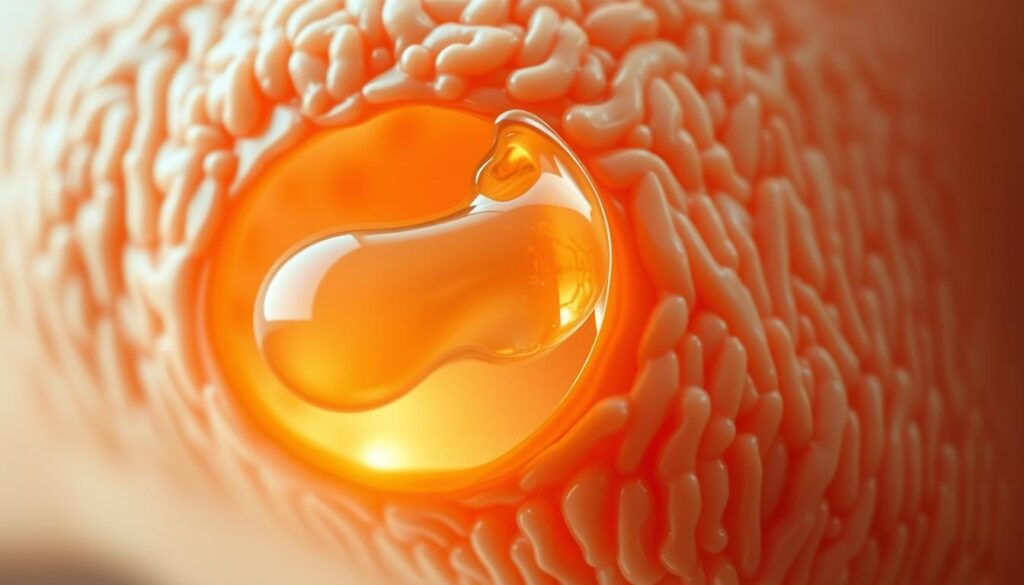Are you tired of using expensive body care products that don’t live up to their promises? You’re not alone. Many of us are looking for effective, science-backed solutions to boost our natural beauty.
Improving your bath and body routine is easier than you think. With simple, affordable tips backed by research, you can enhance your natural beauty. These easy tips can make you feel more confident in your own skin.
Key Takeaways
- Discover simple, affordable ways to boost your natural beauty
- Learn how to incorporate science-backed tips into your daily routine
- Enhance your bath and body routine with effective, research-backed solutions
- Improve your skin health with easy-to-follow tips
- Feel more confident in your own skin with a few simple changes
Understanding the Science of Skin Care
Keeping the skin’s natural pH balance is key for healthy, glowing skin. The skin’s natural pH is slightly acidic, between 4.5 and 5.5.
Using pH-balanced products helps keep the skin’s barrier strong. This prevents irritation. When picking skincare, choose products with a pH close to the skin’s natural level.
The Benefits of Exfoliation
Exfoliation is a game-changer for your skin, bringing many benefits. It removes dead skin cells, making your skin smoother and brighter. Skincare experts say, “Exfoliation is key to maintaining healthy, radiant skin.”
To get the most from exfoliation, knowing how often and what to use is key. Exfoliating too much can irritate your skin, while not enough won’t remove dead cells. Finding the right balance is important.
How Often Should You Exfoliate?
How often you exfoliate depends on your skin type. Most people exfoliate 1-3 times a week. But if your skin is sensitive, start with once a week and increase as needed.
Best Ingredients for Effective Exfoliation
The ingredients you choose for exfoliation matter a lot. Good options include alpha-hydroxy acids (AHAs) like glycolic acid and lactic acid, and beta-hydroxy acids (BHAs) like salicylic acid. Physical exfoliants like sugar and salt are also great. AHAs are best for dry skin, while BHAs are better for oily skin. A study showed, “The right exfoliant can make a big difference in skin health.”
- Glycolic acid: Good for removing dead skin cells and boosting collagen.
- Salicylic acid: Great for oily skin and acne, as it clears pores.
- Sugar and salt: Soft physical exfoliants for most skin types.
Adding exfoliation to your bath and body routine can make your skin smoother and brighter. Choose the right frequency and ingredients for your skin type for the best results.
Moisturizing Myths Debunked
There’s a lot of confusion about moisturizers. It’s important to know the truth to have healthy skin. Many myths surround moisturizing, and understanding them can greatly improve your skincare.
Oil vs. Water-Based Moisturizers
The debate between oil and water-based moisturizers has been ongoing. Oil-based moisturizers are great for dry skin because they lock in moisture. Water-based moisturizers are better for oily skin as they are lighter.
Key differences:
| Characteristics | Oil-Based Moisturizers | Water-Based Moisturizers |
|---|---|---|
| Texture | Thicker, richer | Lighter, more fluid |
| Skin Type | Ideal for dry or mature skin | Suitable for oily skin or acne-prone skin |
| Moisture Retention | Excellent for locking in moisture | Provides hydration without clogging pores |
Scientific Truth About Moisturizer Absorption
One common myth is that moisturizers are fully absorbed into the skin. But, while some ingredients are absorbed, others form a barrier to prevent moisture loss. Knowing this helps you choose the right moisturizer for your skin.

By debunking these myths, you can make better choices for your skincare. Whether you prefer oil or water-based moisturizers, the goal is to find what’s best for your skin. Try different products and mix them to get the best results.
The Power of Hydration for Your Skin
Keeping your skin hydrated is key to its health. Drinking water helps remove toxins and makes your skin look plumper. It also reduces the look of fine lines and wrinkles.
How Much Water Do You Need?
The amount of water you need varies. It depends on your age, sex, weight, and how active you are. A good rule of thumb is to drink at least eight glasses a day.
| Activity Level | Recommended Water Intake |
|---|---|
| Sedentary | 8 glasses/day |
| Moderately Active | 8-10 glasses/day |
| Very Active | 10+ glasses/day |
To keep your body hydrated, eat foods that are high in water. Think watermelon and cucumbers. Also, try to cut down on drinks that dry you out, like caffeine and sugary drinks.
Sun Protection: More Than Just Sunscreen
Sun protection is more than just using sunscreen. Sunscreen is important for skin health, but there’s more to it. Learning about sun protection can really help your skin.

Understanding SPF Ratings
SPF stands for Sun Protection Factor. It shows how well sunscreen protects against UVB rays, which cause sunburn. Higher SPF means more protection. For example, SPF 30 blocks about 96.7% of UVB rays.
When picking sunscreen, think about your skin and what you’ll be doing. For long outdoor times, choose a high SPF broad-spectrum sunscreen. Always apply sunscreen well and reapply every two hours or after swimming or sweating.
Additional Ways to Protect Against UV Damage
There are more ways to protect your skin from UV damage. These include:
- Seeking shade, mainly during peak sun hours (10 am to 4 pm).
- Wearing protective clothing, like long-sleeved shirts, pants, and a wide-brimmed hat.
- Using sunglasses that block 100% of UV rays to protect your eyes and the skin around them.
Some fabrics also protect against UV rays, which is great for outdoor activities. Also, be careful of reflective surfaces like water and sand, as they can increase sun exposure.
“The best way to protect your skin is to be proactive and consistent in your sun protection measures.”
Using these strategies together helps you enjoy the sun safely. Sun protection is not just about avoiding sunburn. It also helps prevent long-term skin damage and skin cancer.
Innovative Hair Care Hacks
Cold water rinses and scalp care are game-changers for your hair. These simple steps can make your hair healthier and more vibrant.
Why You Should Consider Cold Water Rinses
Using cold water to rinse your hair is a big deal. It seals the cuticle, making your hair less frizzy and shinier. Unlike hot water, cold water keeps your hair’s natural oils in, making it softer and healthier.
Scalp Care: The Often Ignored Aspect
Scalp care is key but often forgotten. A healthy scalp is vital for hair growth and avoiding scalp problems. By doing scalp massages and choosing the right scalp products, you can boost your scalp and hair health.
To enhance scalp care, use products with tea tree oil. It fights fungal and bacterial issues. Also, exfoliating your scalp regularly removes dead skin, creating a better environment for hair growth.
Natural Remedies You Can Trust
You don’t need to look far for effective bath and body solutions. Many natural remedies are already in your pantry. For centuries, people have used natural ingredients to care for their skin and hair. Now, science is backing up the benefits of these traditional remedies.
Ingredients You Already Have at Home
Some of the most effective natural remedies are in your kitchen. For example, honey is a natural humectant that retains moisture. It’s perfect for hydrating face masks. Oatmeal soothes irritated skin and can be used in baths or as a gentle exfoliant.
- Coconut oil: Rich in antioxidants and fatty acids, it’s great for moisturizing skin and hair.
- Lemon juice: Acts as a natural astringent and can help brighten skin tone.
- Turmeric: Contains curcumin, which has anti-inflammatory properties beneficial for reducing acne and soothing skin.
When to Choose Natural Over Commercial Products
While commercial products have their place, natural remedies are better in some cases. If you have sensitive skin, natural ingredients are gentler and less likely to cause irritation. Natural remedies are also more environmentally friendly, reducing packaging waste and harsh chemicals.
Some researched bath and body tips suggest natural remedies can be just as effective, if not more so, than commercial products. For example, a simple mixture of sugar and olive oil can serve as an effective exfoliating scrub. Commercial products might contain additional chemicals.
When deciding between natural and commercial products, consider your skin type, the ingredients, and your personal preferences. Proven bath and body tips often highlight the benefits of natural ingredients. By choosing these remedies, you’re caring for your body and supporting a more sustainable lifestyle.
The Role of Diet in Skin and Body Wellness
Eating well is key to keeping your skin healthy. Foods like berries and leafy greens are full of antioxidants. They protect your skin from harm caused by free radicals.
Foods rich in omega-3 fatty acids, such as salmon, also help your skin stay healthy.
It’s important to cut down on sugary foods and drinks. Too much sugar can cause inflammation and stress in your body.
Best Practices for Bathtime Relaxation
Creating the perfect bath experience is more than just filling the tub. It’s about making a moment of peace. To do this, knowing what relaxes us is key.
How Temperature Affects Your Bath Experience
The bath water’s temperature greatly affects your relaxation. Warm water, between 37°C to 40°C, relaxes muscles and calms the mind. But, water that’s too hot can cause dehydration and discomfort.
A warm-to-hot bath followed by a cool rinse can wake up your body. It ends the day feeling refreshed. It’s about finding the perfect temperature for you.
Adding Epsom Salt: The Science Behind It
Epsom salt, full of magnesium, is a favorite for baths. It works by being absorbed through the skin. This helps reduce inflammation, improves circulation, and relaxes muscles.
Adding Epsom salt to your bath releases magnesium and sulfate ions. These are absorbed by the body. It helps reduce stress and improves sleep. For the best effect, add 1-2 cups of Epsom salt and soak for 15 minutes.
By using these bathing tips backed by science, you can make your bath time better. Whether it’s changing the water temperature or adding Epsom salt, these body care tips that work can greatly improve your self-care routine.
Common Mistakes in Bath & Body Care
Many of us make mistakes in our bath and body care routines. These mistakes can harm our skin’s health and look. Two big errors are using too much of a product and not checking when it expires.
Using too much of a product can irritate your skin. For instance, too much moisturizer can block pores. On the other hand, using too much exfoliant can make your skin red and sore.
To steer clear of these mistakes, pay attention to how much you use. Always check the expiration dates of your products. Also, know what’s in your products.
Trending Ingredients That Are Worth Your Time
Exploring effective bath and body tips means keeping up with new ingredients. Some are making a big splash in the industry. They promise to boost your skincare routine, thanks to science.
CBD: The Science Behind Its Popularity
CBD is getting a lot of attention for its body care benefits. Studies show it can calm the skin, reduce inflammation, and improve overall health. Try adding CBD to your routine with creams or serums to see its effects.
The Rise of Niacinamide in Skincare
Niacinamide is becoming more popular, and it’s for a good reason. It’s a form of Vitamin B3 that can make your skin more elastic, reduce inflammation, and strengthen it. Adding Niacinamide to your skincare can lead to amazing results, backed by science.
By keeping up with these trending ingredients, you can make better choices for your bath and body care. This leads to healthier, more radiant skin.
FAQ
What is the ideal pH balance for skin care products?
The best pH for skin care is between 4.5 and 5.5. This is slightly acidic. It helps keep the skin’s natural barrier strong.
How often should I exfoliate my skin?
Exfoliation frequency varies by skin type. Most people should exfoliate one to three times a week. But, if you have sensitive skin, you might need to do it less often.
What is the difference between oil-based and water-based moisturizers?
Oil-based moisturizers create a barrier to lock in moisture. Water-based ones are absorbed quickly, hydrating without feeling greasy.
How much water should I drink to keep my skin hydrated?
Water needs vary based on climate, activity, and health. Drinking at least eight glasses a day is a good start.
What are the signs of dehydration in the skin?
Dehydration signs include dryness, tightness, flakiness, and dullness. Severe cases can cause irritation and sensitivity.
How do I choose the right sunscreen for my skin type?
Choose a sunscreen based on your skin type and protection needs. Look for broad-spectrum ones with the right SPF for your activities.
What are the benefits of using cold water for hair rinses?
Cold water rinses close the hair cuticle, reducing frizz and adding shine. They also improve scalp health by reducing inflammation.
Can natural ingredients be as effective as commercial products?
Yes, natural ingredients like aloe vera, coconut oil, and shea butter are effective. They moisturize and soothe the skin.
How does diet impact skin health?
Diet greatly affects skin health. Eating fruits, vegetables, and omega-3s promotes healthy skin. High sugar intake can cause acne.
What is the optimal temperature for a relaxing bath?
The best bath temperature is 37°C to 40°C. Water that’s too hot can strip oils, while too cool may not relax you.
What are the benefits of adding Epsom salt to my bath?
Epsom salt adds magnesium, which reduces inflammation, improves circulation, and relaxes muscles. It makes baths more relaxing.
How can I avoid common mistakes in bath and body care?
Avoid over-exfoliating and check product expiration dates. Using too many products can irritate skin, while expired ones may not work or cause irritation.
What are the benefits of using CBD and Niacinamide in body care?
CBD soothes irritated skin with its anti-inflammatory properties. Niacinamide improves elasticity, reduces inflammation, and brightens the skin, making it versatile in skincare.

